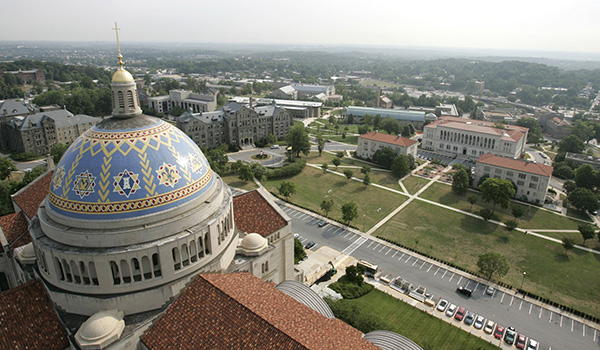
By Gina Christian
(OSV News) — Shelter-in-place orders were issued April 13 at two Catholic universities in Washington, with all-clears declared shortly thereafter, as part of an apparent wave of false threats made against schools throughout the nation the same day and in recent weeks.
At 10 a.m. April 13, the D.C. Metropolitan Police Department received a 911 call alleging “an active shooter on campus,” Brianna Burch, MPD public affairs specialist, told OSV News.
MPD police informed CUA’s public safety department immediately, both in person and by radio, according to a university statement provided to OSV News by Daniel Drummond, CUA’s associate vice president of communications.
The first shelter-in-place alert was sent to the campus community at 10:07 a.m. through Rave, an emergency mass communications platform used by a number of institutions and municipalities. Several additional alerts were subsequently sent out during the event, advising recipients to continue sheltering in place as the search continued, according to the university.
MPD and CUA public safety officers conducted a “systematic search” of the campus buildings and locations, as an MPD helicopter also flew overhead, searching for any active threats, the university said in its statement. After “an exhaustive search of the campus, no threat was found by MPD or DPS,” the university stated, with an “all clear” alert sent out at 11 a.m.
“I thank God for keeping this campus safe today, for our community, and that we quickly came together in response to what turned out to be a call by someone making a false report of a threatening situation at our campus,” said CUA President Peter Kilpatrick in a statement emailed to the university community and families of students.
All classes at the university were canceled for the remainder of the day. CUA also made counseling resources available through its campus ministry, counseling center and Office of the Dean of Students.
Trinity Washington University, located about a mile from CUA, also was placed on a brief lockdown after the MPD received a call about an active shooter at that school.
“The police received the call at about 9:50 a.m.,” Trinity President Patricia McGuire told OSV News. “I was informed about five minutes later and we put out our campus alert.”
McGuire said an all-clear was soon declared and classes resumed, although students were excused if needed, she said, adding the “counseling staff was made available to them.”
“There’s a lot of anxiety about gun violence,” she said. “Some handle it really well, and others cannot deal with the stress.”
Trinity nursing student Indya Fleet said she was still rattled after the lockdown was lifted.
“I was pacing around in my room, like, what do I do?” Fleet told the Trinity Times on campus. “The first thing I did was call my mom. She was telling me to just stay put: ‘Stay there. If you want to come home, come home, after they clear it.’ I was scared.”
Shelter-in-place alerts also were issued April 13 at several schools in Texas, including Baylor University in Waco, Collin College in McKinney, Del Mar College in Corpus Christi, Galen College of Nursing in San Antonio and Texas Wesleyan University in Fort Worth. Threats at all of the schools proved to be false.
On April 12, the Illinois State Police issued a press release stating that local law enforcement in 19 counties had reported a total of 21 calls with threats towards schools, all of which turned out to be unfounded.
The ISP said schools in Illinois and across the country were experiencing increased incidents of swatting — the practice of making false emergency calls to provoke a response from law enforcement, such as a SWAT (special weapons and tactics) team.
“While state and national intelligence agencies have seen a pattern of these fake calls, each call is taken seriously,” said the ISP release.
Senate Majority Leader Chuck Schumer, D-N.Y., called on the FBI to investigate and crack down on swatting, following a March 30 wave of 36 such threats that affected 226 schools across New York state.
Pointing to recent swatting incidents at K-12 schools in Massachusetts, Pennsylvania, Iowa and other states, Schumer said a larger trend may be at work, one involving foreign actors possibly seeking to cause disruption, target specific groups or test law enforcement’s response.
“The bottom line is that Americans need to know who is committing these attacks,” Schumer said, adding that “ensuring that criminals know that if they commit these heinous acts that they will be held accountable is one of the strongest deterrents.”
“That starts with making sure the FBI has the resources it needs (to) bring people to justice swiftly,” he said, “and that the data is being collected to curb this unique disturbing trend.”
